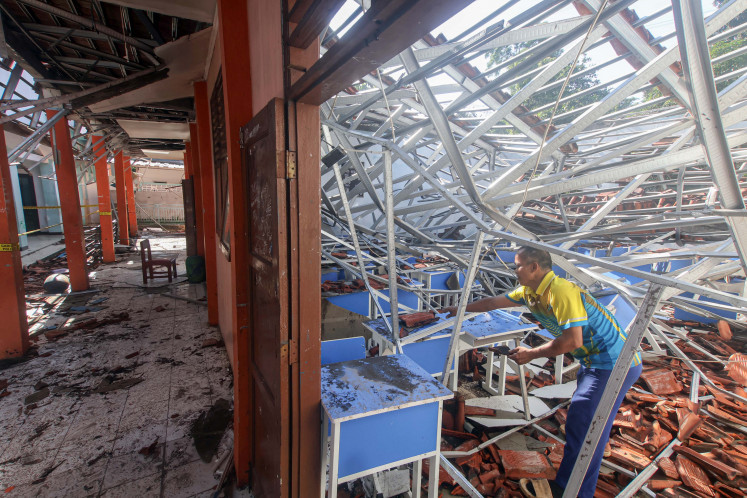Popular Reads
Top Results
Can't find what you're looking for?
View all search resultsPopular Reads
Top Results
Can't find what you're looking for?
View all search resultsJava surplus to be diverted to Sumatra, Bali
The government has projected that Java will experience a surplus in electricity that can financially burden state power company PLN unless the excess can be diverted to Sumatra and Bali
Change text size
Gift Premium Articles
to Anyone
T
he government has projected that Java will experience a surplus in electricity that can financially burden state power company PLN unless the excess can be diverted to Sumatra and Bali.
Energy and Mineral Resources Minister Ignasius Jonan told The Jakarta Post recently that the excess would be 5 to 8 gigawatts (GW) in the next five to six years.
Jonan added that the figure was arrived at even after the electricity supply was deducted by setting aside a requirement to have a 30 percent reserve margin. The reserve margin is the difference between capacity and peak demand — the International Energy Agency recommends a level of 20 to 35 percent to avoid an electricity crisis.
Jonan said the oversupply would occur if all independent power producers (IPPs), that have signed power purchasing agreements (PPAs) with PLN, had all completed their power plants in the next five years but would confront sluggish demand for electricity.
“There’s a concern of oversupply if the economic growth in Java averages at about 5 percent a year. When the IPPs agreed to construct the plants, their assumption was based on the projection that the growth would be at 7 or 8 percent,” said Jonan.
“If that happens we will have an electricity oversupply by 5 to 8 GW after the supply is reduced by a 30 percent reserve margin requirement.”
PLN recently announced that electricity sales only climbed by 1.17 percent to 108.4 terawatt hours (TWh) in the first half of 2017, far below the growth rate of 7.85 percent recorded in the same period last year.
Excess capacity will saddle PLN with a multibillion-dollar bill as it is required to buy the electricity produced by the IPPs under the so-called take-or-pay scheme despite the company being at risk of being jolted with an oversupply as few consumers can absorb the electricity.
Jonan said he had a plan to prevent PLN from financial ruin by constructing a two-way 500 kilovolt high voltage direct current (HVDC) that would link Java with Sumatra and Bali.
“We’re still working to realize this project because the funding is likely to be in the form of loans from the Japan International Cooperation Agency (JICA).”
“This is a concept that was mooted 20 years ago, and I believe that with new technology the cost can be far less today,” he added.
The underwater cable would integrate the grids in Java with Sumatra and electricity could be transmitted back and forth depending on supply and demand.
Citing expected sluggish demand for electricity in Java, PLN postponed the construction of several power plants, with a combined output of 9 GW, in April.
Their construction will not be reconsidered until 2020.
PLN has said the changes were necessary due to the expected slow growth in electricity demand amid sluggish economic activity.
PLN, Indonesia’s biggest state-owned company by assets, has estimated that 13 GW in new supply is sufficient until 2020 for Java, the country’s center of industry and services, lower than the 22 GW estimated in late 2014.
Due to a postponement in construction, the signing of power purchase agreements (PPA) for major projects, such as the 2,000 MW Java 5 coal-fired power plant, the 600 MW Java 10 power plant and the 1,600 MW Java 13 power plant, have been put on hold indefinitely.










